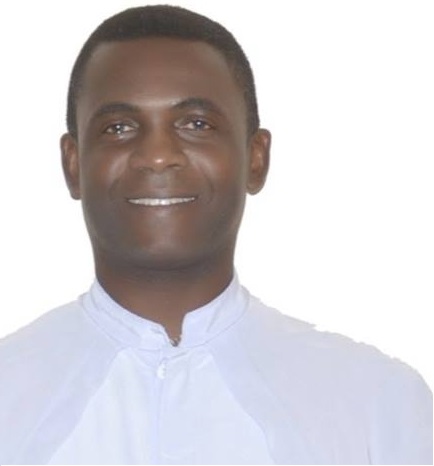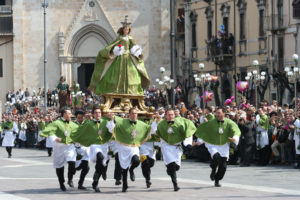When Christ completed His ministry on earth and returned to Heaven, the angel Gabriel asked Him: “What plans have You made for Your good works to continue on Earth?” Jesus answered, “I have chosen twelve men and some women to continue with the ministry and spread the Word.” The angel asked further, “What if these men fail you? What alternative plans do you have?” Jesus answered, “I do not have any other plans. I am counting on them.”
Did Jesus Christ really establish a Church? Yes, He did. He knew very well that if His disciples must remain one in sharing one faith, one Lord, one baptism, there has to be one visible leader. Thus, in the presence of His other apostles, He said to Peter: “You are Peter, and on this rock I shall build My Church” (Matthew 16:18). On another occasion, Jesus called Peter three times, asking him: “Do you love Me?” (John 21:15-17), and after that, Jesus specifically gave him the task of feeding His sheep.
Without a strong, recognized, and universal leader, there is bound to be chaos, and every apostle would have been tempted to establish an independent ministry or Church. Jesus could not have prayed for the unity of the Church without laying the basic foundation of unity, which lies in leadership.
Leadership goes with authority, and so Jesus said to Peter:
“I will give you the keys of the kingdom of Heaven
and whatever you bind on earth shall be bound in Heaven;
and whatever you loose on earth shall be loosed in Heaven.”
~ Matthew 16:19
To bind and loose is similar to having the keys to open or close. The key is a metaphor for authority; and as the keys of the house of David were presented to Eliakim (cf. Isaiah 22:19-23), so were the keys of the kingdom presented to Peter.
The essence of the authority of Peter is not to lord it over others or to be authoritarian, but to guide the Christian community in matters of faith and morals. He is called to be a servant-leader, who together with his brothers is to teach, govern and sanctify the people of God.
Thus, Peter was the first Pope of the Church. The keys of St. Peter were handed over through the years to his successors the Popes, who work in collaboration with Bishops and are considered as the Magisterium (teaching authority of the Church). Their mission is:
“To teach all nations and to preach the Gospel to every creature.”
~ Dogmatic Constitution of the Church, #24
The Pope follows the great footsteps of Peter in being a unifying force for the Church. He imitates the role of Peter who, on Pentecost Day, was the one who spoke on behalf of the Apostles. The Pope occupies the chair of Peter, who led the early Christian community in the election of the disciple to succeed Judas. Like Peter who led the first Church council, which is the Council of Jerusalem, the Pope convenes Church councils.
The Gospel of Matthew describes Peter as the First Apostle (Matthew 10:1) and so is the Pope called primus inter pares (first among equals). Like Peter, the Pope guides the sheep of the flock from error as the scripture predicted:
“There will be a time when they will not endure sound doctrine, but having itching ears, will heap to themselves teachers after their own lusts, and will turn away from the truth (2 Timothy 4:3-4). They also safeguard the flock from false prophets who put forward wrong and destructive teachings.”
~ Peter 2:1-3
Some of Peter’s contemporaries must have wondered, “Why on earth did Jesus select Peter to be the head of the Apostles, knowing full well his record of failures?” This was a man who had denied Jesus and a man who had ran away from Him at a very critical moment. Jesus knew that Peter was not impeccable; nevertheless, he was a good man with a good heart. Besides, Jesus was aware Peter had the positive capacity to rise after falling, and to repent after denying Him.
In fact, it is difficult to understand how God makes His choices. The Apostle Paul says: How inscrutable are God’s judgments and how unsearchable His ways (Romans 11:33). G. K. Chesterton has this to say about the appointment of Peter as head:
When Christ at a symbolic moment was establishing His great society, He chose for its cornerstone neither the brilliant Paul nor the mystic John, but a shuffler, a snob, a coward — in a word, a man. And upon this rock He has built His Church, and the gates of Hell have not prevailed against it. All the empires and the kingdoms have failed, because of this inherent and continual weakness, that they were founded by strong men and upon strong men. But this one thing, the historic Christian Church, was founded on a weak man, and for that reason it is indestructible. For no chain is stronger than its weakest link.
The modern world still expects impeccable and perfect men for the priesthood, and has found none. Modern people are expecting a church full of saints and a church without troubles, and are yet to find one. The media has focused more on reporting about the mistakes of selected church leaders and have neglected to report the many good things the Church is doing in the world today.
When we hear only bad news about the Church daily, we get disappointed and begin to feel that the Church is at the brink of collapse or is about to capsize, but the contrary is the case. The media, in its typical character, is only interested in picking out news concerning deaths, dramas, and destruction.
Today, there is an increasing number of people across the globe who suffer persecution because of their faith. Despite the danger of extinction, they continue to hold strongly to the promise of Jesus to the Church: “The gates of the netherworld shall not prevail.”
The Church has suffered grievous blows, as well as emotional and moral wounds, but Jesus continues to nourish and sustain this vine, which His right hand planted. The strength of an institution is not determined by the number of fatal wounds it gets, but by its capacity to renew itself and move on. If the Church was a human invention, it would have collapsed long time ago, but it is surviving because it was divinely instituted.
Interestingly, the Church has a long history with joyful, sorrowful, luminous and glorious pages. Amazingly, too, the Church has pulled through tough times, and has survived many storms, because it was built on rock.
Let us endeavor to build our lives, our activities, our families on Christ, Who is the solid rock. Thereafter, we’ll have a reason to sing the famous song written by Sr. Marie Therese Winter:
Christ is my rock, my refuge, my stronghold,
Firm as the tree roots that clutches the land,
He who has faith builds without worry,
Not like the man who builds upon sand.
I set my house on a solid foundation;
Christ is my rock, the source of my soul’s recreation.
___
Photo: St. Peter in Chains, Birzebbuga, Malta / Gabriel Izzo on Unsplash / PD-US







2 thoughts on “Built on Rock”
Thank You Fr Musa !!! ….. What a Great Message !!!
I was starting to lose hope on our “Peters” of the Church …
Musical Video was great as well …
God Bless You Father ….
Pingback: Built on Rock | ROMAN CATHOLIC TODAY